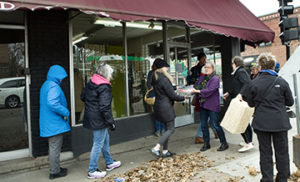By MARGIE O’LOUGHLIN
 Treadle Yard Goods owner Michelle Hoaglund (pictured center in purple) handed out 50 free kits for sewing cotton face masks on March 22. The dedication of Hoaglund and her staff to caring for community members epitomized why “buying local” matters. (Photo by Margie O’Loughlin)[/caption]
Treadle Yard Goods owner Michelle Hoaglund (pictured center in purple) handed out 50 free kits for sewing cotton face masks on March 22. The dedication of Hoaglund and her staff to caring for community members epitomized why “buying local” matters. (Photo by Margie O’Loughlin)[/caption] As efforts to slow the spread of the coronavirus (COVID-19) pandemic ramp up, you may have found yourself trying to find ways to help — while still practicing the social distancing and other important guidelines put in place to protect the health of every person.
One critical need that has emerged over the past few weeks is the need for more personal protective equipment (PPE), such as masks and gowns, in hospitals and other health care settings.
Blue Cross and Blue Shield of Minnesota and Allina Health, along with several community partners, have launched a statewide volunteer effort, calling for people to sew and donate facemasks for doctors, nurses, and other health care staff.
Michelle Hoaglund is the owner of Treadle Yard Goods, a well-established, much loved fabric store on Hamline and Grand avenues in St. Paul. Partnering with the non-profit Sew Good Goods, Hoaglund and her dedicated staff were able to put together 50 free kits with enough cotton fabric and elastic to make 28 CDC approved face masks in each.
Distribution of the kits began at 1 p.m. on Sunday, March 22. By 1:05 p.m., according to Hoaglund, all of the kits were gone. The line of people, which had started to form at noon, stretched all the way to the end of the block and around the corner. People maintained a safe distance between one another, and many bought material from the store once the free kits had been given away.
“It was,” Hoaglund said, “beyond what any of us could have imagined.” She estimated there were between 80-100 people waiting in line and mused, “People who sew are just not the kind to sit around on the couch in a time of crisis.”
Treadle Yard Goods was able to make and distribute more free kits in the week that followed, and they are open regular hours as of our print deadline. The store’s efforts caught the attention of the New York Times in an article published on March 25, exemplifying the basic human desire to help others in a time of crisis.
Check their website for a how-to video with full instructions for making a mask with elastic (www.treadleyardgoods.com). Scroll down and read all of the instructions for safe protocol when dropping off masks. In addition, note the following:
• Cut fabric into 9” X 6” rectangles. Be sure to use fabric that is 100% cotton: tightly woven for the front, flannel or other soft 100% cotton for the back. If you have any doubts about the content of your fabric, don’t use it.
• Prewash all fabric on hot and dry on high heat to ensure pre-shrinkage. Area hospitals or other providers will sanitize the finished masks.
• Instructions suggest the use of elastic of ¼” elastic. If that is not available, you can make fabric ties easily. Each tie should have a finished length of 18 inches on both ends. To make your own ties, cut fabric strips 1 3/4” wide, fold in half and press both edges in to the middle fold. Stitch the ties right across the top and bottom of the mask.
• Use contrasting fabrics, so there is an obvious front and back side.
In this extraordinarily difficult time for small business owners, Hoaglund was reflective. She said, “I made my peace with all of the uncertainty a few days ago. I thought, we can’t control any of what is happening right now – but how we show up and love our neighbors, that’s what counts.”
Many organizations in addition to hospitals need masks including homeless shelters, nursing homes, and funeral homes. For more information about targeted distribution in the Twin Cities and how to help, go to www.donategoodstuff.org, or just follow your instincts and call organizations nearby.
Lyngblomsten, YMCA need masks
The Lyngblomsten Care Center in the Como neighborhood has a critical need for masks. Drop them (in a sealed plastic bag) in the donation bin at 1415 Almond Ave. The Midway YMCA also needs hundreds of masks for childcare workers onsite, and for staff visiting seniors in the community. Staff can accept donations inside the University Avenue entrance, where they are distributing food to the community M-F.
At this point, when people are being asked to consider wearing masks for shopping and other necessary outings, there is no shortage of people known and unknown who would appreciate receiving masks.
Fabric masks are far from ideal in critical health care settings, but they are what can quickly be produced. The mobilization of sewing volunteers has been spontaneous, and the distribution remarkably simple.
No matter where the fabrics are coming from, it’s time to get sewing.
Comments
No comments on this item Please log in to comment by clicking here